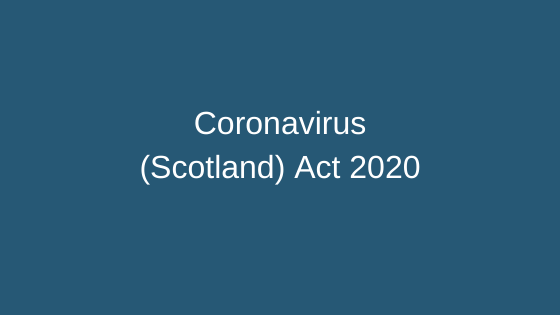
Eviction from Dwelling-houses: Coronavirus (Scotland) Act 2020
Date: 06/04/2020 | COVID-19, Dispute Resolution
The Coronavirus (Scotland) Act 2020 (“2020 Act”) has now been brought in to force. Amongst the various temporary measures brought in by the 2020 Act, significant restrictions have been placed on a landlord’s ability to recover residential property from private tenants.
While there are specific limitations on evictions in each type of private tenancy, there are two general objectives of the interim provisions:
- Providing more discretion to the First Tier Tribunal (FTT) in terms of whether to grant eviction orders; and
- Extension of statutory notice periods.
In order to determine how these new rules affect them, any landlord who is contemplating eviction of their tenant, or any tenant which is facing eviction, should first consider what type of tenancy they have in place.
Private Residential Tenancies (leases entered into after 1 December 2017)
All private residential leases entered into after 1 December 2017 are designated as Private Residential Tenancies (PRT) under Scots Law.
Prior to introduction of the 2020 Act, under the PRT regime, there were very few grounds under which a landlord was granted the absolute right to eviction. These included that the landlord intended to sell or refurbish the property, that the landlord wanted to reside in the property or that the property was being sold by a heritable creditor. There also existed other, discretionary grounds, such as poor behaviour by the tenant.
Under the 2020 Act, all of these grounds have now become discretionary, i.e. the FTT has the power to refuse an application under any of these grounds if it believes that it would be reasonable in the circumstances to do so.
Before being able to make an application for an eviction order from the FTT, a landlord will require to serve a Notice to Leave and for the notice period to expire. Under the 2020 Act, those notice periods have now been extended and the length of extension will depend on the ground of eviction being relied upon; they are now either 3 or 6 months. The exception to this is where the tenant is not occupying the property as his/her home, which remains at 28 days.
Assured Tenancies and Short-Assured Tenancies
The vast majority of tenancies which are not PRTs will be either Assured Tenancies or Short Assured Tenancies. As with the PRT, the FTT will now have the discretion not to award an eviction order for grounds previously designated as mandatory.
Even the s.33 automatic right of recovery procedure available to landlords under a short-assured tenancy has been put in the hands of the FTT to decide whether to grant such eviction would be reasonable.
The notice periods for these types of leases have also been extended and are between 2 and 6 months depending on the ground used to eject the tenant.
Effect on Notices to Quit/Notices to Leave already served, served in error
Where a notice has been served on or after 7 April without taking into account the new changes to notice periods, it will not be automatically deemed valid, but instead the notice period as set out in the 2020 Act will be deemed to apply and an application cannot be made to the FTT until expiry of that notice. The provisions of the 2020 Act in this regard are worded so as to address ‘errors’ in notices and apply to all notices served while this regime is in place. The 2020 Act does not specifically address what is to happen to notices which were served prior to the 2020 Act coming into force 7 April 2020, but have not expired. In the absence of any clarification, it could be argued that the pre-2020 Act regime applies to such notices. Even if this were the case, given the courts and FTT are closed to all but essential business, it is likely to mean that landlords are likely to face lengthy delays in enforcement of such notices.
If you have any queries, please do not hesitate to contact the Davidson Chalmers Stewart Dispute Resolution team.
This article is part of a series covering provisions of the Coronavirus (Scotland) Act 2020. Further information on other aspects of the 2020 Act is available in a separate note.

























































































